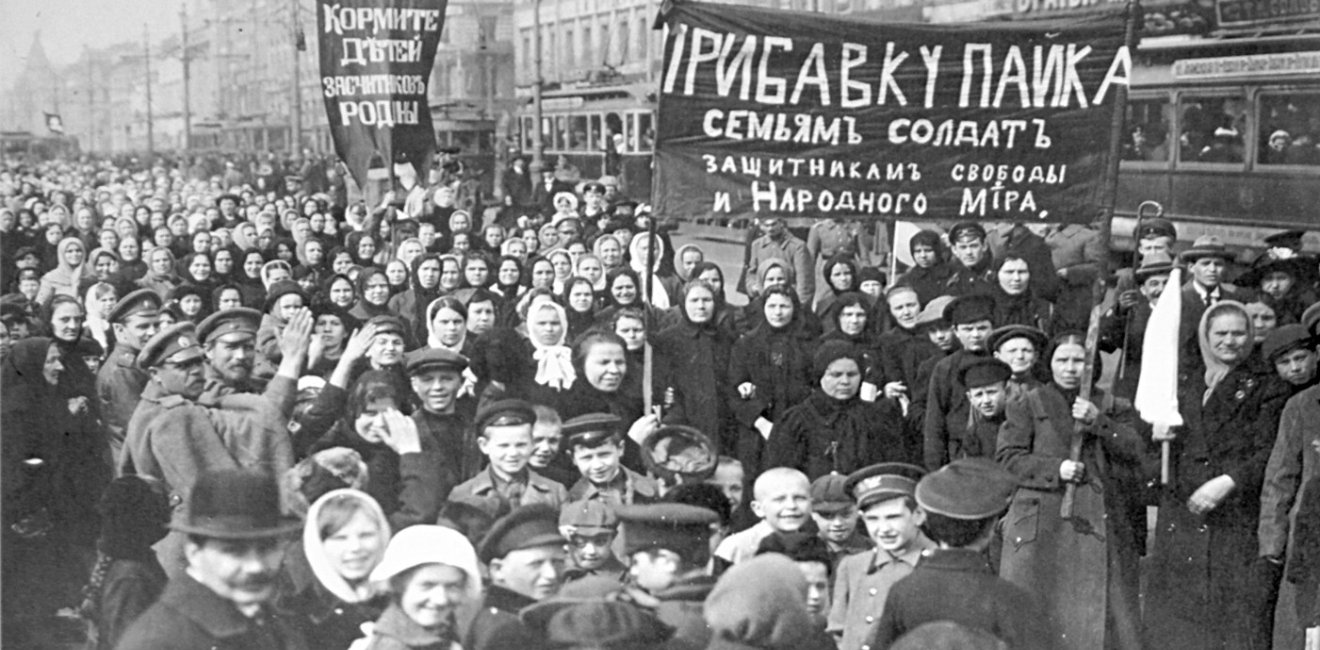
A blog of the Kennan Institute
In 2016, 75 years after the start of World War II, President Vladimir Putin proudly participated in Victory Day commemorations, poignantly holding a picture of his father during the “immortal regiments” march. And yet an even more auspicious date is fast approaching – the centennial of the 1917 Russian revolution – the seminal event that set the terms of the global ideological debate for most of the 20th century.
The centenary of the Russian revolution, therefore, should be a time of major reflection, and indeed, historians in Russia and around the world are marking the occasion with conferences and reappraisals of this crucial anniversary. Vladimir Putin has also called for an honest assessment of the Russian revolution, yet no matter what the results of these studies, they are unlikely to enter Putin’s political narrative.
Putin has already chosen what he needs from the Soviet past: great power status, control of the commanding heights of the economy, victory in World War II, and national stability. The upcoming centennial of the Russian revolution invariably upsets this selected memory and will be more disruptive for Putin than therapeutic.
To begin with, the Russian revolution is about the overthrow of state power. The February revolution was a semi-spontaneous, semi-organized uprising that collapsed the 300-year Romanov dynasty – and its governing institutions – in a matter of days. Putin already had his brush with spontaneous protests in 2011-12, when he returned for his third term as president. He has forcefully (and selectively) punished the participants while introducing laws that sharply limit the ability to demonstrate and dissent. Putin clearly does not want to celebrate a mass protest that proved fatal for the ruling elite.
Indeed, if Putin is likely to honor any aspect of the Russian revolution, it is the Russian soldier who fought bravely to the end while being betrayed by his political leaders.
The February Revolution further witnessed the recognition by the Provisional Government of certain fundamental civil rights, including freedom of speech and assembly; the right to unionize; the abolition of all restrictions based on class, religion, and nationality; and universal suffrage. In the rush to reform, however, the Provisional Government abolished the police, which not only meant that it was unable to protect the above rights, it also lacked the ability to defend basic law and order.
The Provisional Government was no exemplar of political competence or cohesiveness. Nevertheless, its liberal intentions were clear and only serve to highlight how Putin has deviated from the liberal promise that surrounded the collapse of the Soviet Union.
The Provisional Government also presided over the breakdown of the Russian army in 1917, a fatal failing from Putin’s perspective. Indeed, if Putin is likely to honor any aspect of the Russian revolution, it is the Russian soldier who fought bravely to the end while being betrayed by his political leaders.
The October Revolution swept aside the Provisional Government in the name of dictatorship of the proletariat and a future socialist utopia that never materialized. Putin has never been overly ideological, and he apparently has no great nostalgia for Marxism-Leninism. Yet Lenin and the Bolsheviks committed two cardinal sins that, from Putin’s standpoint, can never be forgiven. First, in March 1918, Lenin agreed to the Treaty of Brest-Litovsk that ended Russia’s involvement in World War I and led to the surrender of Russian territory to Germany.
Nothing is more sacred than the unity of Russian state; it dominates the preamble to the 1993 Russian constitution, and Putin has invested his career in promoting political strategies (sovereign democracy, the power vertical) that ensure the integrity of the Russian state. Thus, the 1917 revolution represents the ultimate catastrophe for Putin, since it directly led to the relinquishing of lands that had formed an integral part of the Russian empire.
Putin has no respect for the sovereign nations that the Soviet Union inadvertently created.
Lenin’s mistake could be overlooked, since he gathered up most of the lost territory during the Russian civil war. Yet Lenin (with a direct assist from Stalin) only compounded his error by building the Soviet Union on the nationality principle. The 1922 Union Treaty, which created the Soviet Union, was signed by four national republics: Russia, Belarus, Ukraine, and the then-called Transcaucasian Federative Republic. While retaining strict central control, the Soviet Union proceeded to establish internal regional boundaries, promote ethnic leaders, and endow its national republics with their own cultural institutions. It even recognized the right of secession from the Soviet Union, a purely theoretical right until it wasn’t.
Putin has no respect for the sovereign nations that the Soviet Union inadvertently created. The map of Novorossiya has been put away for the time being, but its message was clear; there was no Ukraine in tsarist Russia. It was only created in the aftermath of the Russian revolution and the attempt by Lenin and the Bolsheviks to assign national borders where none previously had existed. The 1917 revolution culminated some 74 years later in the creation of 15 countries, an outcome that Putin has called the greatest geopolitical disaster of the 20th century.
Lenin’s sin, one should hasten to add, was also Yeltsin’s sin, namely the surrender of territory and recognition of regional autonomy. This may explain Putin’s reluctance to partake in the major reminiscences last year marking the 25th anniversary of the Soviet Union’s collapse. In contrast, the 71st anniversary in 2016 of the end of World War II provided Putin with a grand platform to honor the patriotic sacrifices of ordinary Russian citizens.
The centennial of the Russian revolution provides no similar heroic moment to rally the people around. It may have set the trajectory of the 20th century, but it still divides more than it unites. Putin has stated that he wants an honest evaluation of the Russian revolution. The lessons, however, may not be what he wants to hear or commemorate.
Author


Kennan Institute
After more than 50 years as a vital part of the Wilson Center legacy, the Kennan Institute has become an independent think tank. You can find the current website for the Kennan Institute at kennaninstitute.org. Please look for future announcements about partnership activities between the Wilson Center and the Kennan Institute at Wilson Center Press Room. The Wilson Center is proud of its historic connection to the Kennan Institute and looks forward to supporting its activities as an independent center of knowledge. The Kennan Institute is committed to improving American understanding of Russia, Ukraine, Central Asia, the South Caucasus, and the surrounding region through research and exchange. Read more

Explore More in The Russia File
Browse The Russia File
Chechnya as a Model of Modern Russia

Russia’s Indigenous Communities and the War in Ukraine

Gas and Power in a Changing US–Russia Relationship

